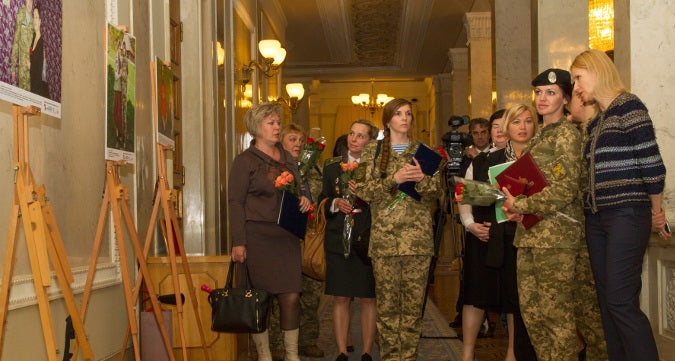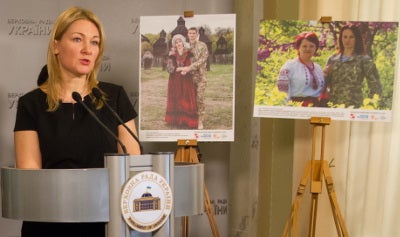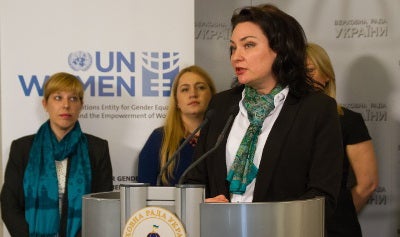Mothers in Ukraine's armed forces face particular discrimination
A photo exhibit by the parliament in Ukraine recognizes the significant contributions made by mothers serving in the armed forces along with mothers of combatants and helps spotlight how modern conflicts affect women.Date:

Ukraine’s Parliament launched a photo exhibition, Mothers in the front line and in the rear, to honour women with children serving in the armed forces, along with mothers of combatants.
Fifteen years after the adoption of the United Nations Security Council Resolution (UNSCR) 1325, implementation of the Women, Peace and Security agenda is far from reality. The Resolution requires parties in a conflict to prevent violations of women's rights, to support women's participation in peace negotiations and in post-conflict reconstruction, and to protect women and girls from sexual and gender-based violence in armed conflict.
The on-going security crisis in Ukraine is one example of how modern conflicts can heavily affect women, without fully involving them in the management and resolution of the crisis, or including them in efforts to maintain peace and security.
A photo exhibition in Ukraine draws particular attention to the issues of women with children serving in the armed forces along with the mothers of combatants.

“This exhibition is a part of the advocacy campaign for the rights of women serving in the Armed Forces. We advocate for lifting restrictions for women's career and occupational discrimination against women in Ukraine,” says Maria Ionova, Member of the Parliament of Ukraine.
While women are under-represented in the Armed Forces of Ukraine, an increasing number of women are willing to join the armed forces. There are 17,000 women in the military, nearly 2,000 of them officers, and 1,500 can officially participate in combat operations, mainly in anti-terrorist operations in Ukraine’s east.
Women in Ukraine’s military face discrimination throughout their career, their needs largely ignored by military and civilian superiors. As more women join the armed forces, Ukraine’s military struggles to accommodate women’s different needs, including protecting the rights of women having children.
Discrimination against mothers in the military is particularly acute. Vital services for emotional trauma and reproductive health are usually not available for women with children.
Women serving in the military must challenge gender and traditional stereotypes to improve their situation. Female combatants do not receive socio-economic reintegration support, and entrenched gender stereotypes often stigmatize women for “counter-cultural” behaviour.
“I serve in the army not to get the awards, but to defend my country. It is very important for women in armed forces that our role and contribution are acknowledged and recognized,” says Tatiana Lepehova, speaking on behalf of female soldiers.

After the adoption of UNSCR 1325 on Women, Peace and Security, many countries successfully established policies to integrate a gender perspective in military operations and increased the number of women serving in their armed forces.
“Backed by the National Action Plan on Women, Peace and Security adopted by the Cabinet of Ministers to implement UNSCR 1325, the Ukraine security and defence reform is an important entry point to introduce gender-responsive legal and policy measures to address women’s different security experiences and priorities,” said Anastasia Divinskaya, UN Women Gender Advisor in Ukraine. “Translating these policies and laws into actual changes in the lives of women in armed forces and their families requires a collective effort by parliament, government and civil society.”
The photo exhibition, Mothers in the front line and in the rear illustrates issues surrounding mothers of combatants and recognises their significant contributions to anti-terrorist operations and protecting servicemen’s rights.
The exhibition was organized by the Parliamentary Inter-Faction Union for Equal Opportunities in collaboration with UN Women Ukraine, the Ukrainian Women’s Fund and the volunteer photo project “If not the war…”